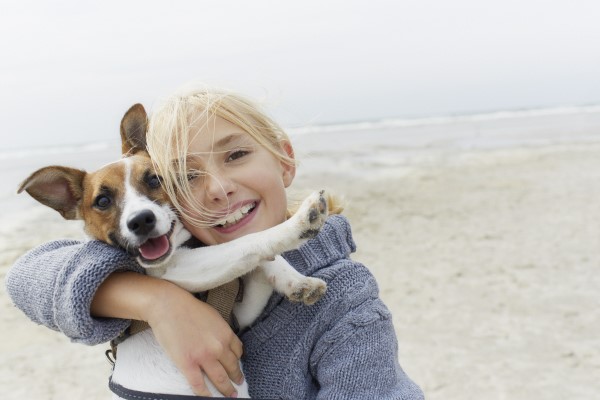The beach is a great place to cool off or go for a walk with your dog but there’s lots to keep in mind before you hit the sand. Australia has some of the world’s most beautiful beaches and it’s a wide-open space for dogs to explore but they’re not always dog friendly.
Keep your dog safe by following these tips.
Before you go
Check the beach allows dogs. Different councils have different rules about dogs on the beach due to the conditions and local wildlife. Often, the information is available online and on signs at the beach entrance. If a beach gives dogs the thumbs up, awesome, but make sure to double check whether your dog must be on a leash or not before you show up; pack one just in case.
Is it low or high tide? It’s important to check the tides because it will affect the physical layout of the beach. It’s handy to be aware of when the tide will shift, especially if you’re going to spend a long time at the beach. At low tide more of the beach will be exposed but the water will rise at high tide, which means less sand to run around on.
Is your dog a strong swimmer? It’s an important question to ask because the beach is one of the worst places to find out if the answer is ‘no’. The water conditions at a beach can be a challenge for the best swimmers so it’s worth being aware of your dog’s limits.
What to pack
Take plenty of freshwater to the beach. Dogs should avoid the temptation to drink seawater because it can make them sick. Keep your dog hydrated with freshwater so they don’t take a sip from the sea.
Lots of poo bags are essential so you can clean up after your dog. Some local councils hand out big fines to people who don’t clean up after their dogs at the beach.
Pack a life vest or watercollar if you know your dog is going to swim a lot. Waves and currents can easily tire dogs in the water and these devices can ease the workload.
Be prepared for any potential mishaps with a first-aid kit. There can be lots of hazards at the beach: sharp rocks, pointy shells and jellyfish with stingers.
If you’re going to protect yourself from the sun; do the same for your dog. Take a sunscreen designed for pets and focus on the areas of their body most sensitive to sun damage: the ears and nose. Sunscreen is important for dogs with short hair and light skin.
The beach is supposed to be fun so don’t forget to bring along your dog’s favourite ball or toys.
Keep in mind
The beach is a wide-open space with so many alluring distractions so there’s the risk your dog may get lost. Minimise the risk by ensuring your dog is microchipped and has a collar with up-to-date contact information.
Sand is hard to run on and it may exhaust your dog quickly. Give your dog time to get used to the sand and keep tabs on their energy levels. Exhaustion can lead to overheating, especially on hot days, so be wary of excessive panting, drooling, coordination problems, vomiting and/or diarrhoea and collapse.
Try to locate shady areas on the beach where your dog can rest and rehydrate. If the sand is hot under your feet, it’s likely to be tough on your dog’s paws. Lay down a blanket or towel to give your dog’s paws a break from hot sand.
Home time
After a fun time at the beach it’s time to rinse down your dog. Give your dog’s coat a good rinse with freshwater. Most beaches have shower facilities for a quick dog rinse, which will get rid of any sand, salt and beach germs. A rinse will reduce the chance of any skin irritation for your dog and it also means they won’t bring the beach smell home.
Want to know how to keep your dog cool in summer? Check out our article about pet safety tips for hot days.


